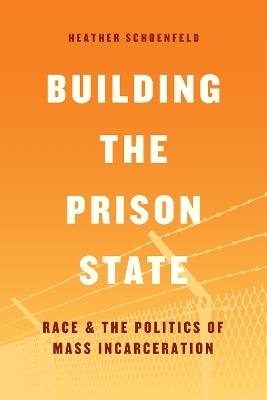
Building the Prison State
Race and the Politics of Mass Incarceration
Seiten
2018
University of Chicago Press (Verlag)
978-0-226-52101-5 (ISBN)
University of Chicago Press (Verlag)
978-0-226-52101-5 (ISBN)
A history of the rise of mass incarceration in America that shows how it was built on a foundation of racist thinking and bad political incentives.
The United States incarcerates more people per capital than any other industrialized nation in the world--about 1 in 100 adults, or more than 2 million people--while national spending on prisons has catapulted 400 percent. Given the vast racial disparities in incarceration, the prison system also reinforces race and class divisions. How and why did we become the world's leading jailer? And what can we, as a society, do about it? Reframing the story of mass incarceration, Heather Schoenfeld illustrates how the unfinished task of full equality for African Americans led to a series of policy choices that expanded the government's power to punish, even as they were designed to protect individuals from arbitrary state violence. Examining civil rights protests, prison condition lawsuits, sentencing reforms, the War on Drugs, and the rise of conservative Tea Party politics, Schoenfeld explains why politicians veered from skepticism of prisons to an embrace of incarceration as the appropriate response to crime. To reduce the number of people behind bars, Schoenfeld argues that we must transform the political incentives for imprisonment and develop a new ideological basis for punishment.
The United States incarcerates more people per capital than any other industrialized nation in the world--about 1 in 100 adults, or more than 2 million people--while national spending on prisons has catapulted 400 percent. Given the vast racial disparities in incarceration, the prison system also reinforces race and class divisions. How and why did we become the world's leading jailer? And what can we, as a society, do about it? Reframing the story of mass incarceration, Heather Schoenfeld illustrates how the unfinished task of full equality for African Americans led to a series of policy choices that expanded the government's power to punish, even as they were designed to protect individuals from arbitrary state violence. Examining civil rights protests, prison condition lawsuits, sentencing reforms, the War on Drugs, and the rise of conservative Tea Party politics, Schoenfeld explains why politicians veered from skepticism of prisons to an embrace of incarceration as the appropriate response to crime. To reduce the number of people behind bars, Schoenfeld argues that we must transform the political incentives for imprisonment and develop a new ideological basis for punishment.
Heather Schoenfeld is a sociologist and assistant professor of legal studies and education and social policy at Northwestern University.
| Erscheinungsdatum | 13.02.2018 |
|---|---|
| Reihe/Serie | Chicago Series in Law and Society |
| Zusatzinfo | 3 halftones, 13 line drawings, 4 tables |
| Sprache | englisch |
| Maße | 152 x 229 mm |
| Themenwelt | Geisteswissenschaften ► Geschichte ► Regional- / Ländergeschichte |
| Recht / Steuern ► Allgemeines / Lexika | |
| Recht / Steuern ► EU / Internationales Recht | |
| Recht / Steuern ► Öffentliches Recht ► Verfassungsrecht | |
| Recht / Steuern ► Strafrecht ► Kriminologie | |
| Sozialwissenschaften ► Soziologie | |
| ISBN-10 | 0-226-52101-X / 022652101X |
| ISBN-13 | 978-0-226-52101-5 / 9780226521015 |
| Zustand | Neuware |
| Haben Sie eine Frage zum Produkt? |
Mehr entdecken
aus dem Bereich
aus dem Bereich
Erinnerungen
Buch | Softcover (2024)
Pantheon (Verlag)
CHF 22,40


